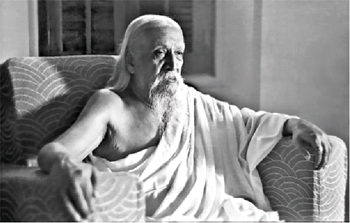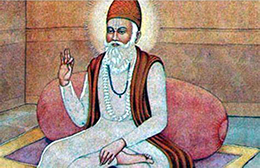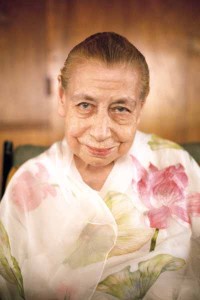Consciousness and health
Sādhanā Through Human Love
Abstract
Love is an important and essential aspect of our life. This article examines love in the light of Sri Aurobindo and The Mother, the common notions of this often mis-used word and explores how we can use our so-called ‘love’, which is mixed with the impurities of selfishness, egoism and self-centeredness, as a ladder, as a stepping-stone, towards its purification, and move towards a love, which is love just for the sake of love. Where there are no conditions attached to it; for in that love lies also our true fulfilment.
Love is a highly misused word. So misused, that it has lost its true meaning in common daily usage. And yet in our ignorance, we continue to use the word ‘love’ to hide our selfish agendas, expectations, demands, and a craving to possess the person we claim to love. We end up inflicting the most torture upon the very person we think we love. The commonly used word ‘love’ hides in its curtain — I want you to fulfil me, to make me happy. And in that, we burden the person we love, we torment ourselves and the other, and continue claiming — ‘I love you.’
Sri Aurobindo and the Mother know very well where we start from, the lower rungs of the ladder of love. But how can we use it to go higher, how can we step onto the next rung and come a bit closer to true love? Let us explore, and since it is our day-to-day life, we must reflect upon what really is love!
Common Notions of Love
Our movies and social media have heavily conditioned our minds and we are carrying those images in our head when we think about love. To love means to stay close to the person you love; to love means to possess the person you love; to love means the person now belongs to you, and are the controller of his/her life; if I love someone, then I become jealous of anyone else coming in close proximity to that person; to love means that the other person is responsible for making me happy.
All these notions do have distorted reflections of Truth actually; which is explained by Sri Aurobindo in The Synthesis of Yoga, where he shares about the highest relationship possible between the individual and the Eternal, as of a Lover and Beloved:
“Love is a passion and it seeks for two things, eternity and intensity, and in the relation of the Lover and the Beloved the seeking for eternity and for intensity is instinctive and self-born. Love is a seeking for mutual possession, and it is here that the demand for mutual possession becomes absolute. Passing beyond desire of possession which means a difference, it is a seeking for oneness, and it is here that the idea of oneness, of two souls merging into each other and becoming one finds the acme of its longing and the utterness of its satisfaction.
“…. Moreover, this relation is that which as between human being and human being demands the most and, even while reaching the greatest intensities, is still the least satisfied, because only in the Divine can it find its real and its utter satisfaction (1).”
But in our ordinary life, we want to possess the other person, which is impossible, as the person is not limited and finite as he/she may appear to be, via our senses. And I am not a finite being, as I may falsely perceive myself. So, my hunger and thirst for contentment is also not finite, it is ever increasing. As Sri Aurobindo says that since it is the hunger of an Infinite being in us, it cannot be satiated with little accumulations. It can only be fulfilled in the Infinite (2).
Coming back to the common notions of love, we torture and torment the people we claim to love. But, first and foremost, we torture our own self, in this incessant obsession with demanding and expecting from the other person like a beggar. We are all begging, and when I look at my own begging, in the name of love, I can become conscious of the begging of billions of beings and pray and aspire to be one drop of begging less in the world full of begging. It is a torture to keep begging for love, for approval, for contentment and happiness. And the more we run in this manner to outward things or persons, the more we suffer and are tortured.
There must be a signal then, in this pain that comes from this incessant begging. What is the universe trying to tell me? Where is the fulfilment that I seek?
Kasturi kundal bhayi, mrig dhoondhe ban maahi,
Aise ghat ghat ram hain, duniya dekhat nahi.
Saint Kabir says that the Kasturi deer is seeking outside for the source of fragrance that he feels is so satisfying, and he keeps looking out in the forest for the source of it, while it is in his own very navel that the fragrance comes from. Just like that Divine, or Love, or Contentment or True happiness, is in our own very body, but we don’t look within.
Turning Within and Finding Love Within
When, after running and wandering around a lot, getting wounded and tormented, I finally get convinced that what I am thirsty for cannot be found outside in the accumulation and possession of material things or persons. And knowing that it is impossible to possess a person, I can turn within myself, having faith that there must be some truth in what the Mystics and Seers have said through the ages. The happiness that we seek outside, the love that we seek outside, is not outside, but within.
Daudat daudat daudiya, jeti mann ki daud,
Daud thake mann sthir bhaya, to vastu thaur ki thaur.
Saint Kabir states that the mind ran, ran and ran in all the directions it could run, and wanted to run, but when it got tired of that running, it found that the very thing it was seeking by running, was found right here within the being.
When we become our own best friend, things begin to change. In all my moods and ups and downs and day-to-day moments of life, people may not be around, I may not get help from someone I love, but I can always be by my side, and provide assistance to my own self. I can, by being friends with myself, go through all the loneliness, the wanting, the seeking, the turmoil; just by giving myself a good company, a lofty company, always utilising my time to uplift myself higher and deeper. And then a change can come in the way I love.
Changing the way I love
Earlier when I claimed, ‘I love you’ — it mostly meant, I want this or that from you, please give me that fulfilment; and if you don’t, I get disappointed. Now, slowly, as I become my own best friend, I know that the fulfilment that I am seeking from relationships can never come with my older ways. I know that just like I am begging, all others are begging too. I don’t want to inflict this torture in the name of love, and poison the name of love. I say to myself, that I am going to take care of myself, nurture, foster myself within, and then I am going to offer myself to this world and that is how I love. Now, in relationships, I am not seeking like a beggar, but just a presence, willing to offer love, presence and whatever may be the need of the hour.
My fulfilment does not depend on the outer, it comes from within me, and hence I don’t continue to torture myself or the other in a claim of love. I now don’t want to possess, for the simple reason that I know I cannot. All finite beings are just in appearance finite and limited, but in actuality they too are infinite beings, and hence cannot be possessed. With this understanding, I also see that whenever there is a grasping in me, a craving in me to possess or to control the other person in the name of love, it is just the falsehood of the ego-consciousness, operating always from a sense of lack, and then I have the courage to step back from it. I do not give the sanction to these harmful dictates of the ego consciousness. This sense of lack is not me, and hence I need not listen to the dictates.
And in that understanding and growth, I begin to be one drop of begging less when so much is already there. I promise myself that I am always going to be my own best friend, and in doing that I always live in abundance, rather than in lack, and find solace in myself than in outer appearances. Now I can begin to truly love. To truly want the benefit of the other I love, to truly want the highest and best for the other I love. I love now for the joy of loving, and not for what I get in return. I love because I simply cannot do anything, but love.
“From the minute you start doing yoga (I always speak of those who do yoga, I do not speak about ordinary life), for those who do yoga, to depend upon someone else is like wanting to transform that person into a representative of the Divine Force; now you may be sure there is not one in a hundred millions who can carry the weight: he will break immediately. So never take the attitude of hoping for support, help, comfort from anyone except the Divine. That is absolute; I have never, not once, met anyone who tried to cling to something to find a support there (someone doing yoga or who has been put into touch with yoga) and who was not deceived – it breaks, it stops, one loses one’s support. Then one says, ‘Life is difficult’ – it is not difficult but one must know what one is doing. Never seek a support elsewhere than in the Divine. Never seek satisfaction elsewhere than in the Divine. Never seek the satisfaction of your needs in anyone else except the Divine – never, for anything at all. All your needs can be satisfied only by the Divine. All your weaknesses can be borne and healed only by the Divine. He alone is capable of giving you what you need in everything, always, and if you try to find any satisfaction or support or help or joy or… heaven knows what, in anyone else, you will always fall on your nose one day, and that always hurts, sometimes even hurts very much (3).”
References
1. Sri Aurobindo. The Complete Works of Sri Aurobindo, Volume 23-24. Pondicherry: Sri Aurobindo Ashram Trust; 1999, p.569-70.
2. Ibid., p 656.
3. The Mother. The Collected Works of the Mother, Volume. 4. Cent ed. Pondicherry: Sri Aurobindo Ashram Trust; 1972, 2003, p. 390.
Suggested Reading
{Online] Available from:
https://auropublications.org/wp-content/uploads /2022/07/09-Preparing-for-Yoga-through-Human-Love.pdf [Accessed 29thNovember 2023]
Dr. Monica Gulati, a learner and a seeker, is based in Gurgaon, India and an editor of NAMAH.
Share with us (Comments,contributions,opinions)
When reproducing this feature, please credit NAMAH,and give the byline. Please send us cuttings.





